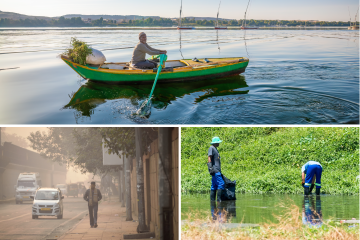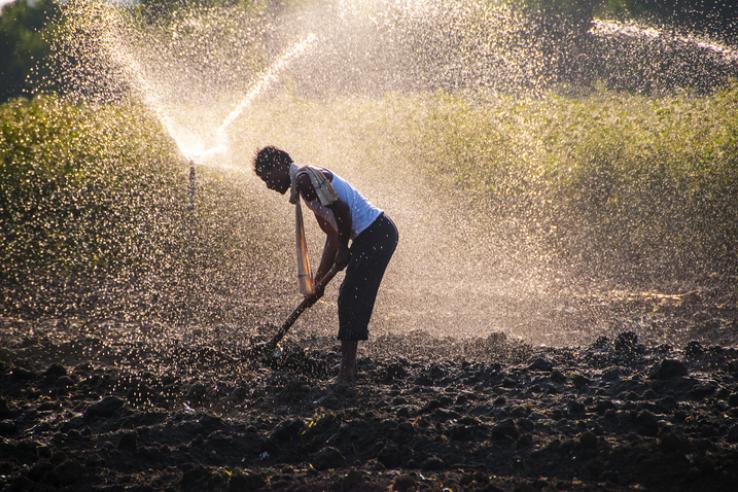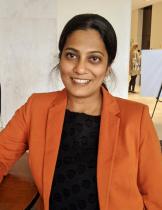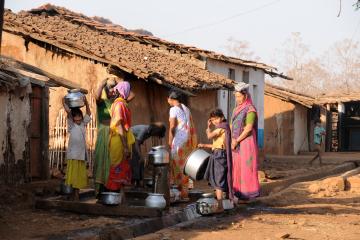
J-PAL South Asia and Community Jameel reaffirm their commitment to increase clean air and water access with the launch of SARWA

The G20 meeting concluded earlier this month in India’s capital, New Delhi, once again brought the health of the planet into sharp focus. The leaders of the G20 countries, in their joint declaration, impressed upon the need for urgent action to “address environmental crises” and emphasized the significance of healthy ecosystems to prevent environmental degradation and water scarcity.
This international pledge comes at a crucial time.
Two of the most fundamental necessities for human survival are under stress today: clean air and water. Polluted air and water are causing people to live shorter, sicker, and less productive lives. And it threatens to reverse the decades of progress we have made in poverty alleviation. Solutions are scarce as the availability of rigorous evidence and data to characterize the extent of the challenges is limited.
To fight this pressing problem, J-PAL, with Community Jameel, has launched the Air and Water Labs with government partners in Africa, MENA, and South Asia. Together, these labs aim to improve clean air and water access for millions of people by informing the decisions of city, state, and national governments that together serve nearly 260 million people.
In India, the AWL is known as Solutions and Advancements through Research for Water and Air (SARWA).
Under SARWA, J-PAL South Asia will be working with governments—both at the national and state levels—to accelerate the adoption of scientific evidence and data for designing impactful policies and strengthening their institutional capacity to respond to critical air and water challenges.
The Government of India—with programs such as the Jal Jeevan Mission (National Drinking Water Program) and the National Clean Air Action Plan—has laid out a bold and ambitious vision for protecting the environment. And SARWA will enable J-PAL South Asia to play a vital role in helping the government achieve its goals.
J-PAL South Asia signed two separate letters of intent with the Gujarat Pollution Control Board (GPCB) and the Rajasthan State Pollution Control Board to collaborate under SARWA at the launch event held in Gandhinagar, capital of India’s Gujarat state.
The Air and Water Labs expand the work of J-PAL’s King Climate Action Initiative, building on the foundational support of King Philanthropies to significantly grow J-PAL’s work at the intersection of climate change and poverty reduction worldwide.
Not “tomorrow’s problem”
Steady industrialization and urbanization have reduced the quality of the air we breathe and the water we drink.
The United Nations in August 2022 passed a resolution that declared a healthy environment—including clean air and water—is a human right. Granted that the resolution is not legally binding, but the cost of inaction—or ineffective action—can have serious consequences for the planet. Some pollutants, such as chlorofluorocarbons, carbon dioxide, methane, and sulfur dioxide, at high levels can not only worsen air quality but also cause global warming. And a warming planet is leading to water shortages all over the world, including in India.
A quick look at the statistics is a sobering reminder of the scale of the problem.
Air pollution alone kills more than seven million people in the world every year. The Air Quality Life Index 2023 finds that high levels of air pollution are shortening the average life expectancy by nearly five years in India. In Africa, indoor and ambient air pollution are growing and contributed to 1.1 million premature deaths in 2019.
Safe drinking water too is increasingly becoming a rare resource. More than 600 million people in India are facing serious water shortages and 70 percent of the water is unfit for drinking, as per an NITI Aayog report in 2018. In the Middle East and North Africa region, 90 percent of children live in areas facing high or extreme water stress. Across Africa, almost 400 million people lack access to safe drinking water.
“Air and water are really the classical public goods, and the consequences of the lack of clean air and water are hitting us hard," said Vini Mahajan, Secretary, Department of Drinking Water and Sanitation, Ministry of Jal Shakti, Government of India. Mahajan was the Guest of Honor for the SARWA launch event.
Changing the status quo
Limited data and evidence on policies that work make it difficult for governments to enforce effective programs. This uncertainty ultimately further harms vulnerable communities.
A recent study in the northern Indian state of Punjab led by J-PAL affiliated researchers illustrates the importance of policy design in implementing solutions that are cost effective as well as efficient.
Every year, farmers in the state set fire to their crop residue to prepare their fields for the winter wheat sowing season—a practice known as stubble burning. Crop fires in nearby states like Punjab account for approximately 30–40 percent of the pollution during the winter months in Delhi. There are several seemingly good solutions to fix this health and environmental hazard, but farmers in Punjab perceive alternatives to burning, like crop residue removal equipment, as too expensive even after government subsidies.
Evidence from the study in Punjab suggests that partial upfront payments to farmers can be effective in reducing crop residue burning. The researchers observed that paying a portion of the money upfront and unconditionally gave farmers the flexibility to choose their preferred method of crop residue management.
That’s why data and scientific evidence have such a pivotal role to play in policymaking—they can help us invest our time, money, and resources in policies that have been found to be effective.
SARWA will spur new partnerships to drive impact at scale
A long-term, multi-stakeholder effort is essential to implement and scale up evidence-based solutions to bring a transformative change in people’s lives. SARWA’s goal is to create an ecosystem of stakeholders—government partners, researchers, NGOs, and donors—to tackle the challenges in air and water.
The program will enable J-PAL South Asia to work closely with strategic government partners to:
 |
Co-identify the most pressing air and water challenges and opportunities for policy innovation. |
| |
|
 |
Expand policymakers’ access to and use of high-quality air and water data, because better and more transparent data on the extent and sources of air and water pollution can help build capacity and political will to change the status quo. |
| |
|
 |
Co-design potential solutions informed by existing evidence, design more targeted policies and use data to monitor progress.. |
| |
|
 |
Co-generate evidence on promising solutions through pilots and randomized evaluations, leveraging existing and new data sources, measure the effectiveness of potential solutions, and determine which ones should be scaled up. |
| |
|
|
Support scaling of air and water policies and programs that are found to be effective. |
|
Leveraging J-PAL South Asia’s deep work with governments
The systematic and seamless processes to translate academic insights into actionable policies that have been developed by J-PAL South Asia with our government partners over the last fifteen years provides a solid foundation for SARWA’s success.
Today, J-PAL South Asia works with over twenty Indian states and union territories to help them identify the most impactful solutions to some of their most pressing problems.
In Gujarat, J-PAL South Asia has been supporting the GPCB in setting up the world’s first emissions trading market for particulate matter since 2008, in collaboration with the Energy Policy Institute at the University of Chicago India. The program began in the city of Surat in 2019.
A randomized evaluation by J-PAL affiliated researchers Michael Greenstone (University of Chicago), Nicholas Ryan (Yale), Rohini Pande (Yale), and Anant Sudarshan (University of Warwick) found that plants participating in the trading scheme in Surat reduced their emissions by 20–30 percent, and helped reduce abatement costs by 12 percent compared with the plants that did not trade. The ETS pilot in Surat has helped achieve the rare win-win of reducing industries’ costs and decreasing pollution emissions, fostering faster economic growth and clean air.
Building off these results and the successful implementation of the pilot, GPCB has announced the expansion of ETS in Gujarat to regulate other highly-polluting clusters. To this end, the market in Surat now covers 340 industrial units, which include the ones that previously did not trade. And from September 2023, 118 industrial plants have begun trading emission permits in Ahmedabad. The work to launch several other markets in air and water is underway in Gujarat and other states.
“Research and evidence-based policy play a crucial role in policymaking and in enabling enrollment of stakeholders to eventually design more targeted policies to reduce air pollution,” said R.B. Barad, Chairman, GPCB.
J-PAL’s global network of more than 870 researchers produce cutting-edge research across eleven sectors, including Environment, Energy, and Climate Change. In India, they are supported by J-PAL South Asia’s local research and policy staff—deeply familiar with India’s policy challenges—who work closely with governments and civil society organizations to close the gap between research and policy action. This model has enabled J-PAL South Asia to respond to the policy priorities of governments in an effective and timely manner.
SARWA will not only leverage this unique model but it will be a shot in the arm for J-PAL South Asia’s efforts to improve the lives of people living in poverty through evidence-based policies.
An increasing number of governments—both in India and around the world—are recognizing the value and the need for scientific data and evidence in making policies. And now the G20 declaration, hopefully, will give fresh impetus for creating development pathways that achieve economic prosperity without harming the planet.
A world in which people can breathe clean air, drink safe water, and live healthy and poverty-free lives is the very essence of SARWA.


